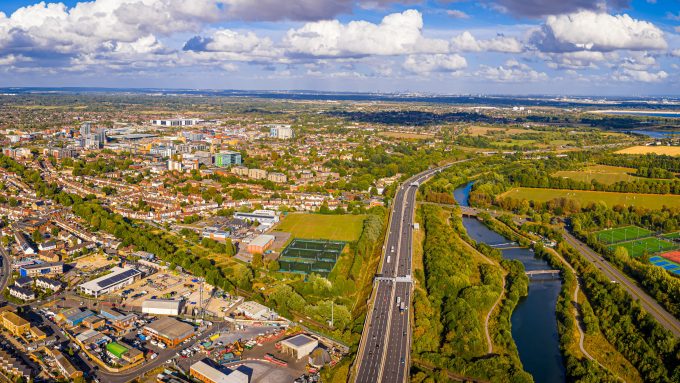
Meet the Academic powering the switch to electric lorries

Accelerating the transition to battery electric vehicles in remote locations is a challenge for private mobility, but arguably more so for the haulage sector. If chargers are not available on the routes where they are most needed, deliveries risk being delayed and freight companies may struggle to make the switch.
In an effort to help Scotland’s freight sector transition to electric, Dr Lewis Hunter of the University of Strathclyde has just completed a six-month study to identify optimal locations for new HGV chargers across the country.
The project – a play on words called WattRoutes – analysed data to identify popular routes used by lorries, and pinpoint rest stops that could benefit from more chargers.
Going forward, a software tool will be created to calculate the energy requirements of haulage fleets, and the capacity of local power networks to support charging points.
Lewis and the university received £44,000 last year to carry out the study through the Transport Research and Innovation Grants (TRIG) programme, delivered by Connected Places Catapult on behalf of the Department for Transport.
“It’s important to make sure there is sufficient charging infrastructure across the country, especially to support businesses in the north of Scotland exporting their goods to Europe,” says Lewis. “But we also need to ensure that many millions of pounds are not spent reinforcing the electrical power distribution network and charging infrastructure in the wrong areas, leading to ‘stranded assets’.”
Support of Catapult and the TRIG programme
Lewis is grateful to the TRIG programme for funding his research time, which allowed “a deep dive into the topic, in order to gain a good understanding of challenges facing the sector”.
He adds that contacts offered by Connected Places Catapult – from those in Whitehall departments to Transport Scotland – helped him to promote his findings further.
In October, Lewis and the University of Strathclyde were recognised for their project at an event in Birmingham, celebrating recent successes on the TRIG programme. He received an award from the Department for Transport’s Chief Scientific Adviser, Professor Sarah Sharples for the ‘Most Innovative Proven Idea’.
Translating research into business benefits
Lewis Hunter is a Knowledge Exchange Associate at the University of Strathclyde in Glasgow, a city he proudly describes as having a long history of innovation, “from the early steam engines, right through to the birth of television”.
“The city has always been at the forefront of global innovation, and being part of a community focused on technology here is fantastic,” he adds.
His background is as an electrical power systems engineer, and describes his role at the University as working closely with academics and researchers to translate their learning for the benefit of businesses, and to identify industry challenges to inform further studies.
Lewis grew up in East Kilbride, south of Glasgow, and from a young age was “fascinated by taking stuff apart and putting it back together” such as amplifiers, computers and speakers.
His curiosity in how electrical equipment worked continued through secondary school where he was “fortunate to have some really inspiring teachers, particularly in physics”. But he also recognises that there was a “real misunderstanding of what an electrical engineer does” – and that needs to change to help encourage more young people into the sector.
“Electrical power is going to be critical to our net zero ambitions, and there are many jobs associated with energy at the current time,” he says.

Lewis studied an electrical engineering degree at Strathclyde University, which included a piece of work around the impact of charging electric vehicles at home. In his final year he secured a scholarship from Scottish Power, which included a visit to the energy firm’s parent company in Spain; to learn more about renewables and power transmission and distribution.
After completing his Masters in 2015, Lewis returned to join the university’s Centre for Doctoral Training in Future Power Networks and Smart Grids; funded by several academic and industrial partners and described by Lewis as “a half-way house between academia and industry”.
He spent four years working towards a PhD, after which he assumed his current position as Knowledge Exchange Associate. “I was working part-time on several interesting projects at the end of my PhD, so it was a natural transition into that role.”
Developing useful initiatives for business
Today, he works for both Strathclyde University and its Power Networks Demonstration Centre to test new devices, develop standards and help “move learnings from university into business.”
Significant recent projects have included ‘FASTER’ – supporting the installation of 73 rapid charging points in western Scotland and along the border regions of Northern Ireland and the Republic.
Another involved a look at innovations around V2X, or ‘vehicle-to-everything’ charging where electric vehicles could be used as battery storage devices on wheels: powering a house during peak periods of electricity demand, or during power outages.
A further project involved deploying power system instrumentation and smart-grid control to support the operation of ‘off-grid’ power systems in communities who are not connected to the main National Grid.
A sideline in music
Lewis focuses on his academic endeavours with Strathclyde four days a week, and runs a separate business on day five specialising in audio system design and commissioning for a range of clients: from designing sound reinforcement systems in music venues, to multi-zone music systems spanning several floors in large hotels and public address systems in football stadia.
Looking forwards, Lewis is keen to continue developing his study of electric heavy-goods vehicle charging and to get “more real-world learning into our research”.
He says a lot more needs to be done in the energy sector to move forward with deploying charging infrastructure, with a “greater emphasis on helping companies that want to green their fleet, but don't have the cash to do it.
“We are in a climate emergency – and need to act.”
Find out more about the Transport Research and Innovation Grants programme and keep your eyes peeled for future opportunities.





